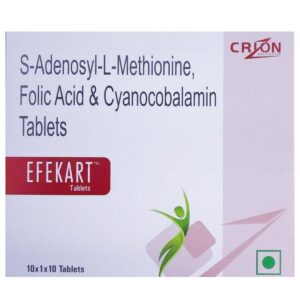FOLIC ACID + CYANOCOBALAMIN + S-ADENOSYL METHIONINE
Folic Acid: Folic acid is a synthetic form of Vitamin B9, which is essential for the formation of red blood cells and DNA. It is commonly used as a dietary supplement and can also be prescribed for certain medical conditions.
The main use of folic acid is to prevent and treat folate deficiency. Folate deficiency can lead to anemia, as well as other symptoms such as fatigue, weakness, and poor growth. Pregnant women are often prescribed folic acid to prevent birth defects in their babies, such as neural tube defects. It may also be prescribed to individuals with certain medical conditions, such as celiac disease, inflammatory bowel disease, or alcoholism, as these conditions can impair folic acid absorption or increase its requirement.
Folic acid works by being converted into its active form called 5-methyltetrahydrofolate in the body. This active form is then involved in various metabolic reactions, including the synthesis of DNA, RNA, and certain amino acids. By supporting these essential processes, folic acid helps in the production of red blood cells and the proper functioning of cells.
The dose of folic acid depends on the specific condition being treated. For folate deficiency, the usual adult dose is 400 to 800 micrograms (mcg) daily. Pregnant women may require higher doses, such as 600 to 800 mcg daily. The dose may vary depending on the individual’s age, sex, and medical history, so it’s essential to consult a healthcare professional for the appropriate dosage.
Folic acid is generally considered safe and well-tolerated when taken within recommended doses. However, some individuals may experience side effects, although they are rare. Possible side effects may include diarrhea, nausea, bloating, or a bitter taste in the mouth. In rare cases, allergic reactions may occur, characterized by symptoms such as rash, itching, swelling, dizziness, or difficulty breathing. If any adverse reactions occur, it is important to seek medical attention immediately.
It is worth noting that high doses of folic acid can mask vitamin B12 deficiency and may be associated with other health risks. Therefore, it is important to follow the recommended dosage guidelines and consult a healthcare professional before starting any supplementation regimen.
Cyanocobalamin: Cyanocobalamin is a synthetic form of vitamin B12, which plays a crucial role in the formation of red blood cells, DNA synthesis, and the functioning of the nervous system. It is used to treat vitamin B12 deficiency, which can lead to anemia and neurological disorders.
The mechanism of action of cyanocobalamin involves its conversion into an active coenzyme form, methylcobalamin, within the body. Methylcobalamin is required for the conversion of homocysteine to methionine and the conversion of methylmalonyl-CoA to succinyl-CoA, both of which are important biochemical reactions.
Cyanocobalamin is available in various forms, including oral tablets, sublingual tablets, nasal sprays, and injections. The dose of cyanocobalamin depends on the severity of the deficiency and the route of administration. The usual oral dose ranges from 1000-2000 mcg per day, while injections may range from 1000-5000 mcg given weekly or monthly.
Most people tolerate cyanocobalamin well, and side effects are rare. However, some individuals may experience allergic reactions, such as itching, hives, or swelling of the face, tongue, or throat. In rare cases, cyanocobalamin may cause diarrhea, nausea, or stomach upset.
It’s important to note that cyanocobalamin should only be used under medical supervision and is not recommended for those with Leber’s disease (a hereditary eye disease) or cobalt or cobalamin allergies. Additionally, cyanocobalamin may interact with certain medications, such as metformin, proton pump inhibitors, or histamine H2-receptor antagonists, so it’s essential to inform your healthcare provider about all the medications you are taking before starting cyanocobalamin therapy.
Overall, cyanocobalamin is an essential vitamin B12 supplement used to treat deficiencies, and it helps to maintain normal red blood cell production and nervous system function.
S-Adenosyl Methionine: S-Adenosyl Methionine, also known as SAMe, is a naturally occurring compound in the body that plays a role in various biological processes. It is available as a dietary supplement and also as a prescription medication in some countries. SAMe is commonly used to treat certain conditions, such as depression, osteoarthritis, and liver disease.
The exact mechanism of action of SAMe is not entirely understood. However, it is known to be involved in the production of neurotransmitters like serotonin, dopamine, and norepinephrine, which are important for mood regulation. SAMe may also help with cartilage formation and repair in osteoarthritis and support liver function.
The dose of SAMe can vary depending on the condition being treated. For depression, the typical dose ranges from 400 to 1600 milligrams per day, divided into two or three doses. In osteoarthritis, a dose of 1200 to 1600 milligrams per day is often recommended. When used for liver disease, the dose can range from 800 to 1600 milligrams per day.
SAMe is generally considered safe for short-term use, with minimal side effects. However, some common side effects may include digestive issues such as nausea, diarrhea, and flatulence. In rare cases, it may cause severe allergic reactions or worsen symptoms in people with bipolar disorder. It is important to speak with a healthcare professional before starting SAMe to determine the appropriate dose and to discuss any potential interactions with other medications or medical conditions.

